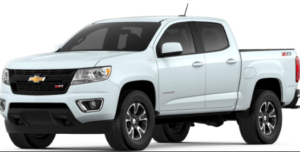There are a few reasons why your Chevy Colorado would be overheating when idling. The most common ones include a bad thermostat, water pump, electric fans, and low coolant level. This guide is intended to help you find the cause of this overheating in the most efficient way possible. So, let’s start with what’s easy and take it from there.
If your Colorado is running and driving fine, but you end up stopped somewhere and it begins overheating when idling, this guide is for you. If it’s overheating at all engine speeds, check out Chevy Colorado Overheating.
Make sure to inspect and work on the engine when it is cold. Electric fans can kick on at any time.
Colorado: Overheating When Idling Causes and Solutions
1. Low Coolant
While it seems counter intuitive, when your Colorado is low on coolant may run ok with wind hitting the radiator, but when idling there’s just not enough coolant to properly cool the engine.
Solution: Fill the radiator and coolant reservoir back up. Never do this when the engine is warm. The cold engine coolant can “shock” the block and cause a crack or even a freeze plug to drop out.
Filling it back up is not the fix. The coolant had to leak from somewhere. Look under the vehicle when it is parked and see if you can see puddles of coolant. If there are, start directly above those puddles in your search.
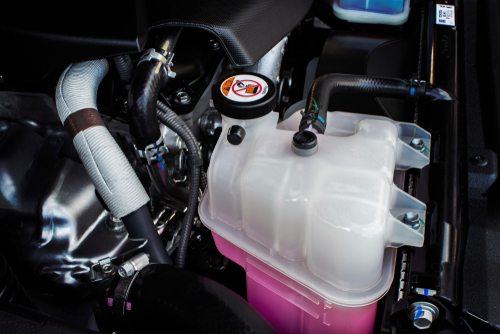
A coolant leak is usually caused by:
- Cracked Hoses– There are two hoses that come and go to your Colorado’s radiator. One sends the hot coolant back from the engine to the radiator to be cooled. And the other one sends the coolant back to the water pump to cool the engine. These hoses can crack with age. Take a look at them and see if they have been leaking. Even if they are dry, they should still have a chalky look to them where they have been leaking coolant (it’s mineral deposits).
- Radiator Leak– Take a look at the radiator itself. Determining if there is a leak is going to depend a lot on whether or not you can easily see the radiator. If it has a big gouge on one of the fins, or a streak going down it that looks like coolant has dripped from it, there’s your leak. Here’s how to find coolant leak.
- Water Pump– There are gaskets between the water pump and the engine block. If one of these gaskets fail, then there’s going to be a leak. This is often a hard one to see, because all of the accessories (alternator, power steering, serpentine belt) are going to obstruct your view. This is often where the leak is coming from when there’s a puddle under the center of the engine bay and you don’t see a leak anywhere. Here are the signs of a bad water pump in the Chevy Colorado.
2. Bad Electric Fan
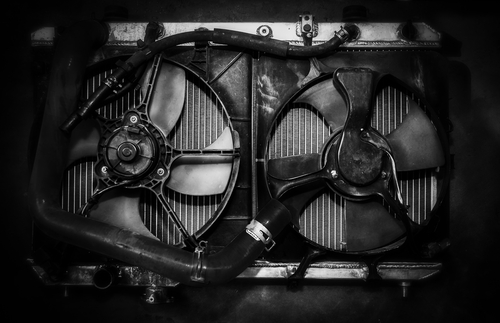
If the coolant level appears to be fine, then the next easiest thing to look at is the fan. Most vehicles use electric fans to cool the radiator when it gets warm enough. These fans are most important when the vehicle is idling. These fans can and do fail.
Solution: With the engine hot and idling (but not yet overheating) pop the hood open and see if the fan is turning. If it is not turning at all you know you have a bad fan.
Check the fuse and fan relay to see if they are getting power. If they are, you’ll need to replace the fan. Here’s a good guide to troubleshooting a radiator fan.
3. Bad Thermostat
Next on the list is the thermostat. Your Colorado’s thermostat controls when coolant does and doesn’t enter the engine. It’ll either be on the block or water pump.
Solution: It can be tough to tell if a thermostat is bad without just replacing it. Does the vehicle get hot within a few minutes of driving (and the coolant is full)? That could be enough to tell that the thermostat isn’t opening all the way. It usually takes an engine a while to overheat when it is full of coolant.
You’ll need to replace it, which is about a 2/10 in mechanical difficulty. Most likely you’ll just need a ratchet, extension, and 10mm socket.
Here’s more on this: Chevy Colorado: Bad Thermostat Diagnosis
4. Bad Water Pump
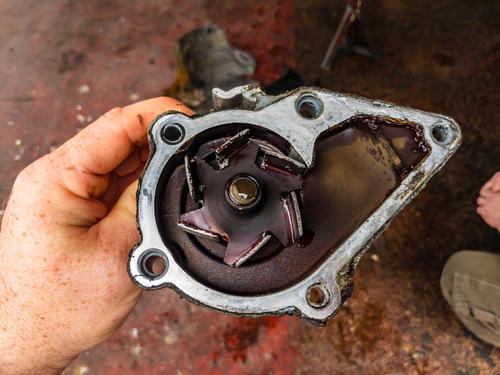
The water pump in your car is turned by the Colorado’s engine accessory drive system. As the engine rpm increases, so does the speed of the water pump. When the vehicle is idle, the water pump is turning slowly.
Solution: A bad water pump isn’t efficient. When the car is overheating when idling the water pump is not able to move the coolant through the radiator and back to the engine. You can test this by putting the car in neutral or park and revving the engine to about 1000 RPM under the redline for a few seconds. You should see the temperature dip as the water pump spools up.
Replacing a water pump is only as challenging as getting to it. Which, depending on it’s location, can be relatively easy or a total nightmare.
Here’s more on diagnosing a bad water pump.
Honorable Mention: Temp Gauge
While your Colorado’s temperature gauge is usually pretty reliable, it still is an electrical device that can fail. A mechanic would check the temperature of the engine manually with a heat gun in order to ensure that the gauge was reading correctly before tackling the repair.
When the car is overheating when idling and you SMELL the smells associated with a temp that is too high, you can throw the temp gauge theory out.
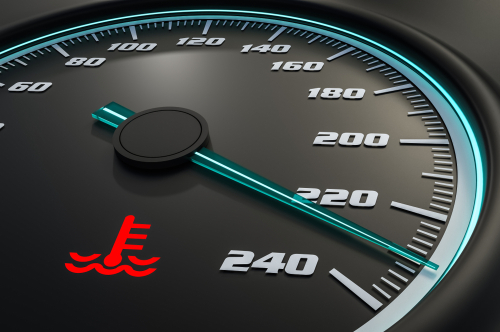
Conclusion: Chevy Colorado Overheating When Idling
Hopefully, this guide to why your Colorado may be overheating when idle helped you fix your vehicle. If there is anything that you would like to add that could help the next person with theirs, your comment below is most welcome.

